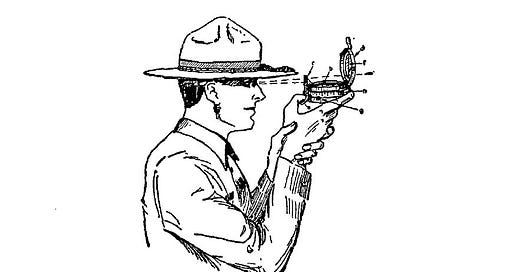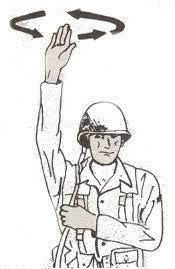Staying on Azimuth
Or- How to successfully navigate through the seven levels of the candy cane forest, and the sea of swirly-twirly gum drops.
Think. What I’m thinking about:
Over the last few weeks, we have talked about habits. We can use them to automate the processes of our day, and we have discussed how we can replace bad habits with better ones by attacking the weak point of the Cue, Craving, Response, or Reward cycle.
But it is important to remember that our habits are more powerful if they are in service of something, if they are guideposts leading us to a goal.
Otherwise, they simply become random acts of self-improvement. That isn’t necessarily bad, but they may not be keeping us on our route.
I like to think of this like a recon patrol in the military. We begin with the mission, defining the objective: What do we want, Where is it, When do we want it by, and most importantly, Why do we want it and what are we prepared to do for it?
If we have done our homework, the ultimate objective is our guiding constellation, the Southern Cross or Sky Anchor that I have discussed.
This gives us the azimuth to follow.
To keep on track on a patrol we establish checkpoints on the map. These are steps along the way that not only ensure we are staying on course, but also show us how far we have come. Checkpoints are like goals, Specific, Measurable, Attainable, Relevant, and Time-bound locations in our future that will demonstrate the progress we have made in adhering to our habits of process.
On patrol, between each checkpoint are Rally Points. These are usually designated along the way. The function of a Rally Point is to give us a place to fall back to when something bad happens. On a patrol that is usually breaking contact with the enemy or getting hopelessly off course. In life it is pretty much the same, the enemy is just different.
On the way to our goals, especially during this time of year, there will be adversity: a missed workout, a late night, too many cookies, or too much beer. The key is to fall back on process. Move back to to the last Rally Point, regroup, and remind yourself of the next checkpoint and why you selected it in the first place because it is a signpost on the road to your sky anchor.
Read. The Ranger Handbook. TC 3-21.76
Because you can never go wrong if you’re following the Handbook
Write. The part where I answer your questions
I received several emails asking about New Year’s resolutions and my thoughts on them, so here goes:
Resolution is just a fancy name for habit and you know I am a fan of habits. I am not, however, a fan of New Year’s resolutions for several reasons:
I fall into the school of, “The best time to plant a tree was twenty years ago, the next best time is now.” If you want to accomplish something, do it then. Don’t wait.
On January 1st you will probably be too tired, or hungover, or have too many leftovers to deal with, or decorations to take down, then it is February and you are still stalling. By March you will vow to wait until Jan 2024.
But, If you are saving yourself up for 2023, consider applying the five principles of patrolling to get you started right:
Planning, Reconnaissance, Security, Control, and Common Sense.
Planning: Make a plan now. Start with the end in mind. Where do you want to be in a year’s time? Establish checkpoints and rally points along the route, and write them down.
Reconnaissance: We do reconnaissance to confirm what we know and learn what we don’t. Get curious and learn as much as possible about the new habits you want to build.
Security: This can be as simple as enlisting the help of a friend who will hold you accountable, just remember that you are ultimately responsible for your own actions, not them.
Control: Remember, you can control effort. You can control process. If you control effort and process, you can largely control performance. You can’t control outcome. Focus on what you can control and always ask, what is the next, best thing that I can do to improve my position?
Common sense: This is the most difficult principle to master. The Ranger Handbook defines it as using all available information and good judgment to make sound timely decisions. Easy to say. hard to do, but self-mastery, like Ranger School, is “not for the weak or fainthearted.”
Establish good rally points, fall back on them when bad things happen, regroup, sharpen your hatchet, and come back out swinging.
Repeat. Words worth repeating from those who said it best:
“The secret of getting ahead is getting started.” ~ Mark Twain
“The best way to get started is to quit talking and begin doing.” ~ Walt Disney
“Go confidently in the direction of your dreams. Live the life you have imagined.” ~ Henry David Thoreau
“Take action. An inch of movement will bring you closer to your goals than a mile of intention.” ~ Steve Maraboli
“Let the enemy come ‘till he’s almost close enough to touch. Then let him have it and jump out and finish him with your hatchet.” ~ Major Robert Rodgers, 1759
As always, thanks for reading and I’d love to hear about your New Year’s Resolutions. If you enjoy Think. Read. Write. Repeat. please share with a friend.









Great Stuff. Super advice, I've been tracking your framework, and I like it a lot.
I've been using 7 lines of effort for my personal annual planning (Faith, Family, Finances, Fitness, Friends, Fun, Fulfillment). It has gaps, and I really appreciate what you are discussing and ruminating on.
All the best.
Doom
Great article, post Corps it is easy to forget the discipline that got you to your current post. Thank you and I will stay on azimuth.